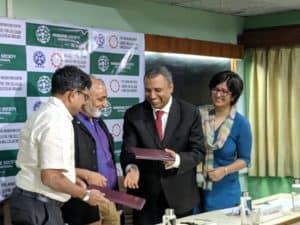25 April 2019
 Atal Incubation Centre (AIC) at the Centre for Cellular and Molecular Biology (CCMB), in collaboration with Humane Society International/ India (HSI/India), has launched the Centre for Predictive Human Model Systems, a centre dedicated to enable a paradigm shift in science by focusing on 21st century new approach methodologies instead of animal models. The centre aims to prioritize investment in human-based, non-animal methodologies in life sciences research in India. This will be done by establishing a multi – stakeholder think-tank that represents the growing body of expertise on new approach methodologies on a scientific and policy level. Keeping in mind the 21st century biomedical science and toxicology motive globally to break siloes and forge partnerships among the scientific community for better flow of knowledge, support for research and open-access publication of literature will be a focus of the centre.
Atal Incubation Centre (AIC) at the Centre for Cellular and Molecular Biology (CCMB), in collaboration with Humane Society International/ India (HSI/India), has launched the Centre for Predictive Human Model Systems, a centre dedicated to enable a paradigm shift in science by focusing on 21st century new approach methodologies instead of animal models. The centre aims to prioritize investment in human-based, non-animal methodologies in life sciences research in India. This will be done by establishing a multi – stakeholder think-tank that represents the growing body of expertise on new approach methodologies on a scientific and policy level. Keeping in mind the 21st century biomedical science and toxicology motive globally to break siloes and forge partnerships among the scientific community for better flow of knowledge, support for research and open-access publication of literature will be a focus of the centre.
“This centre is a natural alignment to AIC’s objective of supporting new innovation and technologies. This sector of predictive human biology is ripe for investment and I am certain that this partnership with HSI/India will kindle the much-needed investment in this field,” said Dr Madhusudan Rao, CEO of AIC – CCMB.
“We are excited about the collaboration which has helped establish the centre. With the uniqueness that the centre brings, we endeavour to plug the loopholes that the health research faces. We aim for this centre to be the pioneer in promoting advanced, accurate, reliable science which is also more ethical,” said Alokparna Sengupta, deputy director at HSI/India.
Researchers have been critically assessing the validity and reliability of data obtained from animal experimentation to predict human outcomes and develop a better understanding of the human physiology. New approach methodologies that do not involve the use of live animals are demonstrating more human relevance and thus promise improved outcomes for human health protection and medical interventions. This collaboration envisions a future for India to be a key player in 21st century biomedical and toxicological research through investment, capacity building, and policy level changes.

Post a comment